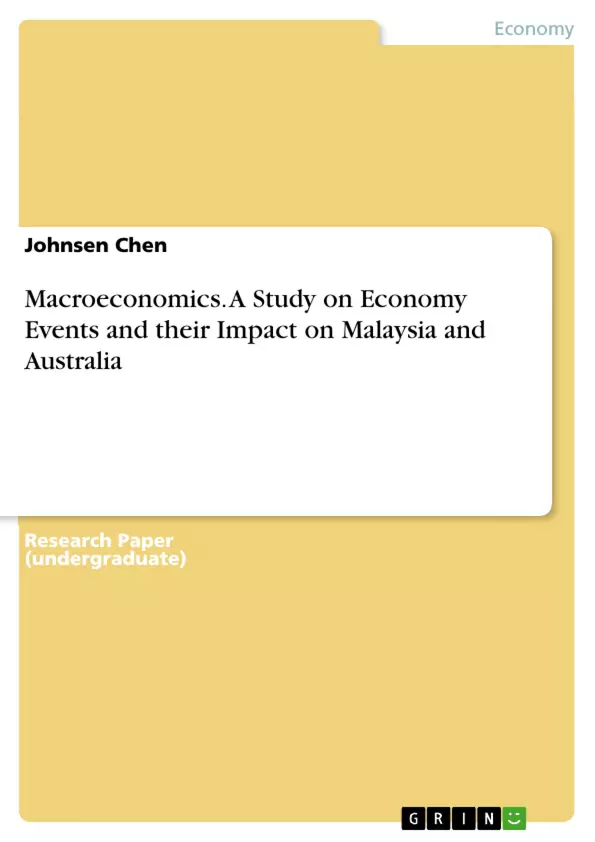This report is made as required for the completion of the macroeconomic subject. It investigates economy events for the last decade and its impacts to Malaysia and Australia economy performances.
Asian Financial Crisis event is chosen merely because this event is arguably the most influencing global economy event during the last decade.
Analysis will start from both countries economy performances and conditions during the crisis (1997-1998). Sources of information are mostly gathered from internet researches and other relevant materials such as economic journals and books. Data collected are analyzed and hypotheses drawn are based on my understanding of macroeconomic subject.
Inhaltsverzeichnis (Table of Contents)
- Introduction
- Malaysia
- Economic Performances
- Asian Financial Crisis (1997-1998)
- Investors' Confidence
- Capital Outflow
- Stock Market
- External Debt
- Correcting problems
- Australia
- Foreign Direct Investment (FDI)
- Monetary Exchange Policy
- Balance of Payment (BOP)
- Conclusion
Zielsetzung und Themenschwerpunkte (Objectives and Key Themes)
This report examines the economic events of the past decade and their impact on the economies of Malaysia and Australia. The Asian Financial Crisis of 1997-1998 is the main event studied, due to its significant influence on global economies. The report analyzes economic performance and conditions in both countries during the crisis, drawing on research from the internet, economic journals, and books.
- Economic performance of Malaysia and Australia before and during the Asian Financial Crisis
- The impact of the Asian Financial Crisis on Malaysia and Australia
- The role of foreign direct investment (FDI) in the Malaysian economy
- The impact of capital outflows and currency devaluation on the Malaysian economy
- The importance of monetary exchange policy in managing economic crises
Zusammenfassung der Kapitel (Chapter Summaries)
This report focuses on the economic impacts of the Asian Financial Crisis (1997-1998) on Malaysia and Australia. The report first examines Malaysia's economic performance before the crisis, highlighting its reliance on foreign direct investment (FDI) and its vulnerability to external fluctuations.
The report then delves into the Asian Financial Crisis, analyzing the loss of investor confidence in Malaysia, the resulting capital outflows, and the devaluation of the Malaysian Ringgit (RM). It explores the impact of these events on the stock market, external debt, and the overall economy.
The report then shifts focus to Australia, briefly touching upon its foreign direct investment, monetary exchange policy, and balance of payment. While Australia is not directly impacted by the Asian Financial Crisis as Malaysia is, the report will be exploring how the economic events affected the country.
Schlüsselwörter (Keywords)
This report focuses on macroeconomic analysis, with key themes including the Asian Financial Crisis, economic performance, foreign direct investment, capital outflows, currency devaluation, monetary exchange policy, and balance of payment. The report examines the impact of these economic events on Malaysia and Australia, drawing on empirical data and macroeconomic theory.
Frequently Asked Questions
What was the impact of the 1997 Asian Financial Crisis on Malaysia?
The crisis led to a loss of investor confidence, significant capital outflows, and a sharp devaluation of the Malaysian Ringgit (RM).
How did Foreign Direct Investment (FDI) influence Malaysia's economy?
Malaysia relied heavily on FDI for growth, which made its economy vulnerable to external fluctuations and the sudden withdrawal of capital during the crisis.
Was Australia affected by the Asian Financial Crisis in the same way?
While not as directly impacted as Malaysia, Australia had to manage its balance of payments and monetary policies to mitigate the regional economic instability.
What macroeconomic factors are analyzed in the report?
The report examines stock market performance, external debt, monetary exchange policy, and Foreign Direct Investment (FDI).
How did Malaysia correct the problems caused by the crisis?
The government implemented measures to stabilize the currency and restore investor confidence, moving away from purely liberal capital flows for a period.
- Quote paper
- Johnsen Chen (Author), 2004, Macroeconomics. A Study on Economy Events and their Impact on Malaysia and Australia, Munich, GRIN Verlag, https://www.grin.com/document/200944



